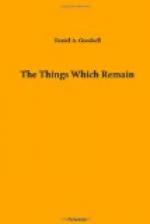[Sidenote: Some Influential Facts.]
[Sidenote: A Great Mistake.]
[Sidenote: Doctored Heathenism.]
Whatever relation the fact may have as a cause, it is noteworthy that as to time, this new era of doubt largely coincides as to its beginning with the movement to revise the New Testament. The variations of the manuscripts, the interpretations, the comparatively late date of the oldest manuscripts were before this in possession of scholars only. The daily press have made them the possession of the Christian world. The shock to traditional confidence through this was very great. The Congress of Religions at Chicago had a similar effect. The mistaken liberality which permitted Christianity to appear on the same platform with the ethnic and imperfect religions contributed largely to doctrinal indifference. The taking and uncandid misrepresentations of these religions convinced many that there was at least no better foundation for Christianity and no better content therein than for and in the false and imperfect faiths. Many of these were defended by men who had had an English education and had come into contact with Christian vocabulary and civilization. They did not hesitate to read into these religions ideas wholly Christian and wholly foreign to the original teachings.
[Sidenote: What Remains?]
These and other considerations lead me to ask what remains that we may and do believe? While far from admitting as finally proved the radical conclusions reached by some as to authorship and inspiration of the Bible and Divine authority for doctrines deduced therefrom, it must be profitable for us to ask, “What remains if some of these conclusions stand?”
Recall that I do not admit all these for a moment, or any of them as final. Some are probably true. But taking the worst and most iconoclastic as true, are we compelled even then to surrender our Christian faith?
[Sidenote: The Apostles’ Creed.]
Let us take the separate articles of the Apostles’ Creed and see how they stand affected:
[Sidenote: The Fatherhood of God.]
“I believe in God the Father Almighty, Maker of heaven and earth.”
[Sidenote: A Christian God.]
Surely this remains untouched and in full force. Huxley, to requote what has before been quoted, says: “I can not see one tittle of evidence that the great unknown stands to us in the light of a Father.” What a contradiction is here! He knows that the great unknown can not be proved to be our Father. Then he must know of the great unknown the negative aspects so minutely as to be sure that no Fatherhood is in the great unknown. Then he knows the great unknown much better than he is willing to admit, better than an agnostic ought.
[Sidenote: An All Pervasive Spirit.]
[Sidenote: His Commandments.]
[Sidenote: The Divine Ideal.]




